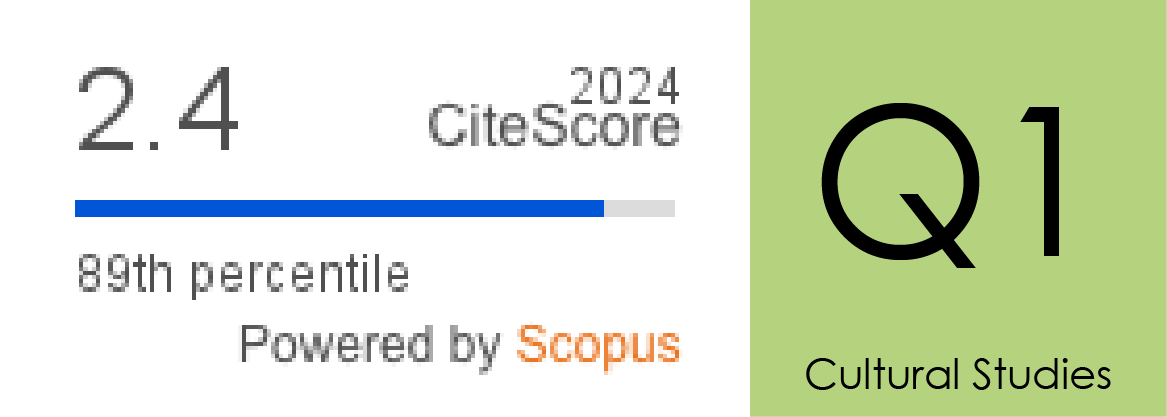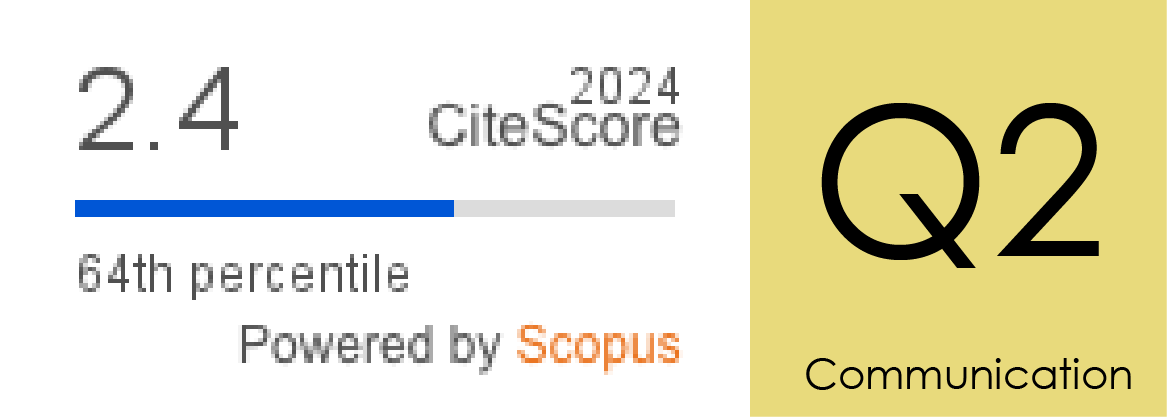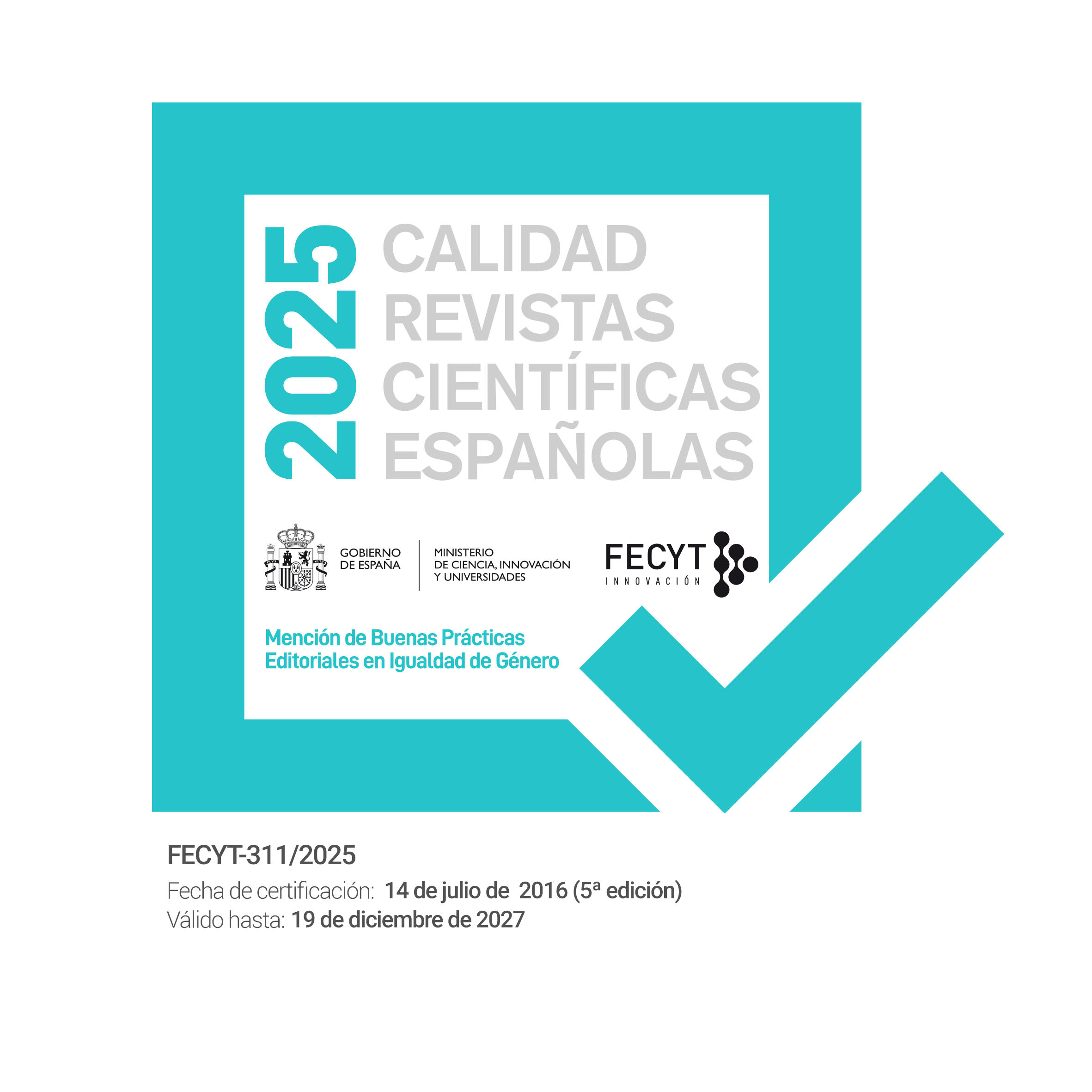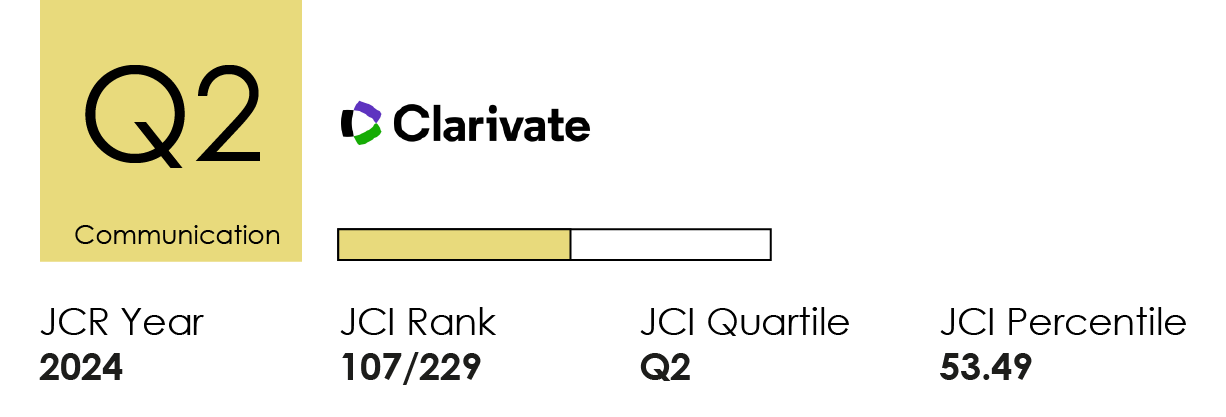Celebridades politizadas contra la extrema derecha en Twitter. Las preferencias políticas y la actividad de los usuarios al retuitear el tuit de Rosalía contra Vox después de las elecciones generales de 2019 en España
DOI:
https://doi.org/10.14198/MEDCOM.19953Palabras clave:
Celebridades políticas, Twitter, extrema derecha, Vox, España, elecciones generalesResumen
Las celebridades utilizan las redes sociales para interaccionar y movilizar a sus audiencias (Zilinsky, Vaccari, Nagler & Tucker, 2019). Las celebridades politizadas pueden asumir rol de líderes con el objetivo de confrontar el monopolio de los políticos e incrementar la notoriedad de causas específicas (Street, 2004; Wheeler, 2013). El objetivo de este artículo es analizar el impacto de las celebridades políticas en Twitter entre audiencias politizadas y no politizadas. Nos enfocamos en el caso de la cantante Rosalía, quien publicó un breve tuit contra Vox con el texto “Fuck Vox” tras las elecciones generales de noviembre de 2019. Medimos preferencias políticas y actividad de los seguidores de Rosalía, los retuiteadores del post tuit y los usuarios que habían retuiteado a la cantante antes del tuit y después. Los resultados muestran que Rosalía tuvo un gran impacto entre partidos de izquierda y separatistas, y entre usuarios sin preferencias políticas o actividad política. También encontramos que los seguidores de Rosalía tenían menos probabilidad de ser activos políticamente (Loader, Vromen & Xenos, 2016). Esta investigación arroja luz sobre el potencial impacto de las celebridades políticas para movilizar a sus audiencias no politizadas y contraponer a la extrema derecha en las redes sociales.
Financiación
MCIU/AEI/FEDER, UE under Grant PGC2018-097352-A-I00Citas
Alonso-Muñoz, L. y Casero-Ripollés, A. (2018). Comunicación de los líderes populistas europeos en Twitter: construcción de la agenda y efecto “más es menos”. El Profesional de la Información, 27(6), 1193-1202. https://doi.org/ds27
Amaral, I.; Zamora, R.; Grandío, M. M. & Noguera, J. M. (2016). Flows of communication and ‘influentials’ in Twitter: A comparative approach between Portugal and Spain. Observatorio (OBS*) Journal, 10(2), 111-128. https://bit.ly/3oQgKwD
Atkinson, M. D. & DeWitt, D. (2018). Does Celebrity Issue Advocacy Mobilize Issue Publics? Political Studies, 67(1), 83-99. https://doi.org/gz7d
Austin, E. W.; van de Vord, R.; Pinkleton, B. E. & Epstein, E. (2008). Celebrity endorsements and their potential to motivate young voters. Mass Communication and Society, 11(4), 420–436. https://doi.org/c9b9r5
Barberá, P. (2015). Birds of the same feather tweet together: Bayesian ideal point estimation using twitter data. Political Analysis, 23, 76–91. https://doi.org/f63r45
Blasco-Duatis, M. y Coenders, G. (2020). Análisis de sentimiento de la agenda de los partidos políticos españoles en Twitter durante la Moción de Censura de 2018. Un enfoque de datos composicionales. Revista Mediterránea de Comunicación/Mediterranean Journal of Communication, 11(2), 185-198. https://doi.org/gz7f
boyd, D.; Golder, S. & Lotan, G. (2010). Tweet, tweet, retweet: Conversational aspects of retweeting on twitter. In Proceedings of the Annual Hawaii International Conference on System Sciences (pp. 1-10). IEEE. https://doi.org/cn6wj3
Bruns, A. & Highfield, T. (2013). Political Networks on Twitter. Information, Communication & Society, 16(5), 667-691. https://doi.org/gc7mvz
Ceron, A.; Curini, L.; Iacus, S. M. & Porro, G. (2014). Every tweet counts? How sentiment analysis of social media can improve our knowledge of citizens’ political preferences with an application to Italy and France. New Media and Society, 16(2), 340-358. https://doi.org/ggj7dw
Cifuentes, C. F. y Pino, J. F. (2018). Conmigo o contra mí: análisis de la concordancia y estrategias temáticas del Centro Democrático en Twitter. Palabra Clave, 21(3), 885-916. https://doi.org/gz7j
Conover, M. D.; Ratkiewicz, J.; Francisco, M.; Gonçalves, B.; Flammini, A. & Menczer, F. (2011). Political polarization on twitter. ICWSM, 133, 89–96.
Couldry, N. & Markham, T. (2007). Celebrity culture and public connection: Bridge or chasm? International Journal of Cultural Studies, 10(4), 403–421. https://doi.org/cb4mxq
El País (10/11/2019). Socialists win repeat Spanish election, Vox becomes third-biggest force in Congress. El País. https://bit.ly/3FAMJHh
Engesser, S.; Fawzi, N. & Larsson, A. O. (2017). Populist online communication: Introduction to the special issue. Information, communication & society, 20(9), 1279–1292. https://doi.org/gf3ghw
Erdogan, B. Z. (1999). Celebrity endorsement: a literature review. Journal of Marketing Management, 15(4), 291-314. https://doi.org/d6b9zx
Fang, A.; Habel, P.; Ounis, I. & MacDonald, C. (2019). Votes on Twitter: Assessing Candidate Preferences and Topics of Discussion During the 2016 U.S. Presidential Election. SAGE Open, 9(1), 1-17. https://doi.org/gz7p
Garthwaite, C. & Moore, T. J. (2013). Can celebrity endorsements affect political outcomes? evidence from the 2008 US democratic presidential primary. Journal of Law, Economics, and Organization, 29(2). https://doi.org/brgr
Gelado-Marcos, R.; Rubira-García, R. y Navío-Navarro, M. (2019). Comunicando en los nuevos entornos. El impacto de Twitter en la Comunicación Política española. Revista Mediterránea de Comunicación, 10(2), 73-84. https://doi.org/gz7n
Gibson, R. K.; Cantijoch, M. & Ward, S. (2010). Citizen participation in the e-campaign. In R. K. Gibson, A. Williamson y S. Ward (Eds), The Internet and the 2010 Election: Putting the Small ‘p’ Back in Politics? (pp. 5–16). London: Hansard Society.
Golbeck, J. & Hansen, D. L. (2011). Computing political preference among Twitter followers. In Proceedings Conference on Human Factors in Computing Systems (pp. 1105-1108). https://doi.org/bkbfxz
Golbeck, J. & Hansen, D. (2014). A method for computing political preference among Twitter followers. Social Networks, 36, 177–184. https://doi.org/f5md86
González-Bailón, S.; Wang, N.; Rivero, A.; Borge-Holthoefer, J. & Moreno, Y. (2014). Assessing the bias in communication networks sampled from twitter. Social Networks, 38, 16-27. https://doi.org/gz7r
Graham, T.; Jackson, D. & Broersma, M. (2014). New Platform, Old Habits? Candidates’ Use of Twitter during the 2010 British and Dutch General Election Campaigns. New Media & Society, 18(5), 765-783. https://doi.org/cv2q
Guerrero-Solé, F. (2017). Community detection in political discussions on Twitter: An application of the retweet overlap network method to the Catalan process towards independence. Social Science Computer Review, 35, 244–261. https://doi.org/f9xbbq
Guerrero-Solé, F. (2018). Interactive Behavior in Political Discussions on Twitter: Politicians, Media, and Citizens’ Patterns of Interaction in the 2015 and 2016 Electoral Campaigns in Spain. Social Media + Society, 1–16. https://doi.org/gz7t
Guerrero-Solé, F.; Corominas-Murtra, B. & López-González, H. (2014). Pacts with Twitter: Predicting voters’ indecision and preferences for coalitions in multiparty systems. Information, Communication & Society, 17, 1280–1297. https://doi.org/gz7v
Guerrero-Solé & López-González, H. (2019). Government formation and political discussions in Twitter: An extended model for quantifying political distances in multiparty democracies. Social Science Computer Review, 37, 3–21. https://doi.org/gctpz8
Guerrero-Solé, F.; Suárez-Gonzalo, S.; Rovira, C. & Codina, L. (2020). Social media, context collapse and the future of data-driven populism. El Profesional de la Información, 29(5). https://doi.org/gj8dbn
Gobierno de España (Ministerio del Interior). Real Decreto 551/2019, de 24 de septiembre, de disolución del Congreso de los Diputados y del Senado y de convocatoria de elecciones. Boletín Oficial del Estado. http://www.infoelectoral.mir.es/infoelectoral/min/busquedaAvanzadaAction.html?vuelta=1&private=0
Hemphill, L.; Otterbacher, J. & Shapiro, M. (2013). What's congress doing on twitter? In Proceedings of the 2013 conference on Computer supported cooperative work (CSCW '13) (pp. 877-886). https://doi.org/gfzzp5
Hosch-Dayican, B.; Amrit, C.; Aarts, K. & Dassen, A. (2016). How Do Online Citizens Persuade Fellow Voters? Using Twitter During the 2012 Dutch Parliamentary Election Campaign. Social Science Computer Review, 34(2), 135–152. https://doi.org/f8cwrn
Hung, K. (2014). Why Celebrity Sells: A Dual Entertainment Path Model of Brand Endorsement. Journal of Advertising, 43(2), 155-166. https://doi.org/gctmrc
Jackson, D. J. (2008). Selling politics: The impact of celebrities’ political belief on young Americans. Journal of Political Marketing, 6(4), 67-83. https://doi.org/db3495
Jackson, D. J. (2009). Entertainment & politics: The influence of pop culture on young adult political socialization. New York: Peter Lang Publishing.
Jackson, D. J. & Darrow, T. I. A. (2005). The influence of celebrity endorsements on young adults’ political opinions. Harvard International Journal of Press/Politics, 10(3), 80-98. https://doi.org/bdf4rh
Kornhauser, W. (1959). The Politics of Mass Society. Glencoe, Illinois: The Free Press.
Loader, B. D.; Vromen, A. & Xenos, M. A. (2016). Performing for the young networked citizen? Celebrity politics, social networking and the political engagement of young people. Media, Culture & Society, 38(3), 400–419. https://doi.org/ggb6hk
Lopez, J. (27/11/2018). Rosalía Is Flamenco’s Rule-Defying Renegade. The Nation. https://bit.ly/3asVyo3
López-López, P. C. y Vásquez-González, J. (2018). Agenda temática y Twitter: elecciones presidenciales en América Latina durante el período 2015-2017. El Profesional de la Información, 27(6), 1204-1214. https://doi.org/gj8cm4
Mark, H. (2018). Celebrity Influence: Politics, Persuasion, and Issue-Based Advocacy. Lawrence: University Press of Kansas.
Markham, T. (2015). Celebrity advocacy and public engagement: The divergent uses of celebrity. International Journal of Cultural Studies, 18(4), 467-480. https://doi.org/gz77
Mazzoleni, G. (2007). Populism and the media. In Twenty-First Century Populism: The Spectre of Western European Democracy (pp. 49–64). https://doi.org/dhmdp9
Mejia, P. (18/12/2019). How Rosalía’s Radical Take on Flamenco Found Worldwide Resonance. Vulture. https://bit.ly/2X0VMj8
Moats, D. & Borra, E. (2018). Quali-quantitative methods beyond networks: Studying information diffusion on Twitter with the Modulation Sequencer. Big Data and Society, 1-17. https://doi.org/gd8v8h
Nisbett, G. S. & DeWalt, C. C. (2016). Exploring the influence of celebrities in politics: A focus group study of young voters. Atlantic Journal of Communication, 24(3), 144-156. https://doi.org/gj74hp
Nownes, A. J. (2012). An experimental investigation of the effects of celebrity support for political parties in the United States. American Politics Research, 40(3), 476-500. https://doi.org/btr3pq
Pariser, E. (2012). The Filter Bubble: How the New Personalized Web Is Changing What We Read and How We Think. Penguin Books.
Partzsch, L. (2015). The power of celebrities in global politics. Celebrity Studies, 6(2), 178-191. https://doi.org/gz78
Pease, A. & Brewer, P.R. (2008). The Oprah Factor: The Effects of a Celebrity Endorsement in a Presidential Primary Campaign. The International Journal of Press/Politics, 13(4), 386-400. https://doi.org/d5wb54
Said-Hung, E. M.; Prati, R.C. & Cancino-Borbón, A. (2017). La orientación ideológica de los mensajes publicados en Twitter durante el 24M en España. Palabra Clave, 20(1), 213-238. https://doi.org/ggmrfc
Street, J. (2004). Celebrity politicians: Popular culture and political representation. British Journal of Politics and International Relations, 6(4), 435–452. https://doi.org/bq76nc
Street, J. (2012). Do Celebrity Politics and Celebrity Politicians Matter? British Journal of Politics and International Relations, 14(3), 346-356. https://doi.org/fxpmxx
Turnbull-Dugarte, S. J. (2019). Explaining the end of Spanish exceptionalism and electoral support for Vox. Research and Politics, 6(2), 1-8. https://doi.org/ggdwfp
Veer, E.; Becirovic, I. & Martin, B. A. S. (2010). If Kate voted Conservative, would you? European Journal of Marketing, 44(3/4), 436-450. https://doi.org/dgxxbs
Vergeer, M. & Hermans, L. (2013). Campaigning on Twitter: Microblogging and Online Social Networking as Campaign Tools in the 2010 General Elections in the Netherlands. Journal of Computer-Mediated Communication, 18(4), 399–419. https://doi.org/f45bd5
Wang, Y. & Luo, J. (2017). When Celebrities Endorse Politicians: Analyzing the Behavior of Celebrity Followers in the 2016 U.S. Presidential Election. arXiv. https://bit.ly/3AzIM1A
Waisbord, S. (2018). Why populism is troubling for democratic communication. Communication, Culture & Critique, 11(1), 21-34. https://doi.org/gk8x6c
Wheeler, M. (2018). Celebrity Politics and Cultural Studies Within the United States and United Kingdom. Oxford Research Encyclopedia of Communication. https://doi.org/gz8b
Wheeler, M. (2013). Celebrity politics: image and identity in contemporary political communications. Cambridge: Polity Press.
Williams, H. T. P.; McMurray, J. R.; Kurz, T. & Lambert, F. H. (2015). Network Analysis Reveals Open Forums and Echo Chambers in Social Media Discussions of Climate Change. Global Environmental Change, 32, 126–38. https://doi.org/f7fd77
Zilinsky, J.; Vaccari, C.; Nagler, J. & Tucker, J. (2019). Don’t Republicans Tweet Too? Using Twitter to Assess the Consequences of Political Endorsements by Celebrities. Perspectives on Politics, 1-17. https://doi.org/gz8c
Descargas
Estadísticas
Publicado
Cómo citar
Número
Sección
Licencia
Derechos de autor 2022 Frederic Guerrero-Solé, Eva Pujadas, Toni Aira, Lluís Mas-Manchón

Esta obra está bajo una licencia internacional Creative Commons Atribución 4.0.
Los autores y autoras que publican en esta revista están de acuerdo con los siguientes términos:
1 Derechos de autor. Los autores y autoras conservan sus derechos de autor, aunque ceden a la revista de forma no exclusiva los derechos de explotación (reproducción, distribución, comunicación pública y transformación) y garantizan a esta el derecho de primera publicación de su trabajo, el cual estará simultáneamente sujeto a la licencia indicada en punto 2. Los autores pueden establecer otros acuerdos adicionales para la distribución no exclusiva de la versión de la obra publicada en la revista, siempre que exista un reconocimiento de su publicación inicial en esta revista.
© Los autores.
2 Licencia. Los trabajos se publican en la revista sujetos a la licencia de Reconocimiento 4.0 Internacional de Creative Commons (CC BY 4.0); los términos se pueden consultar en https://creativecommons.org/licenses/by/4.0/
Esta licencia permite a terceros compartir (copiar y redistribuir el material en cualquier medio o formato) y adaptar (remezclar, transformar y crear a partir del material para cualquier finalidad, incluso comercial), siempre que se reconozca la autoría y la primera publicación en esta revista (Revista Mediterránea de Comunicación (RMC) / Mediterranean Journal of Communication (MJC), Universidad de Alicante, DOI de la obra), se proporcione un enlace a la licencia y se indique si se han realizado cambios en la obra.
3 Política de autoarchivo. Se recomienda a los autores que difundan sus trabajos a través de Internet para favorecer una circulación y difusión más rápidas y, con ello, un posible aumento en la citación y alcance entre la comunidad científica y académica, en las siguientes condiciones:
No se permite a los autores depositar en un repositorio institucional o temático, página web propia, etc., las versiones preprint (versión antes de ser evaluada) o postprint (versión evaluada y aceptada para su publicación) de sus trabajos antes de su publicación, pero sí el artículo final publicado (versión del editor).














